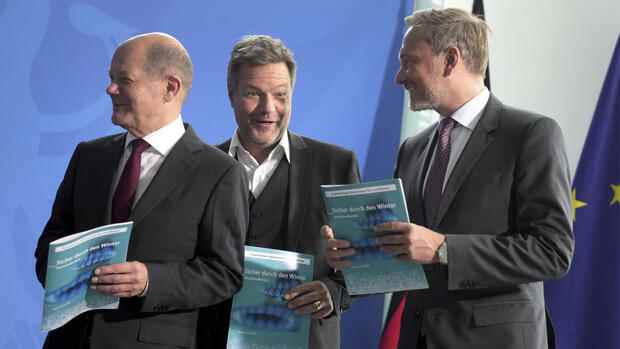Olaf Scholz, Robert Habeck and Christian Lindner with the report of the Gas Expert Commission.
(Photo: AP)
It’s difficult to keep track of the flood of proposals with which the federal government wants to implement its relief packages. This even applies to the management levels of the ministries, which sometimes do not yet know at the beginning of the week what the cabinet is supposed to pass on Wednesday. The government regulates its gas and electricity price brake in a piecemeal manner.
The citizens and companies that are supposed to be helped have long since lost track of who gets reimbursed for what by whom and when. Even the supposedly simple emergency aid for December is high arithmetic: The relief is based on the annual consumption forecast on which the down payment in September is based. A twelfth of this must be multiplied by the December price.
>> Read here: Everything at a glance: This is how gas and electricity price brakes work – consumers can expect this help
One suspects that the billing of this help will cost energy suppliers, homeowners, administrators and tenants a lot of time and nerves. Not to mention the implementation of the later gas and electricity price brake. The energy companies, on which politicians want to shift most of the work, are already fearing the worst.
Top jobs of the day
Find the best jobs now and
be notified by email.
Despite all the warnings, the traffic light coalition took too much time in the summer, so that it now has to design help in the fall under enormous time pressure so that these citizens and companies can still somehow reach them in the winter. Speed is now the primary goal, not accuracy or individual justice. This is unfortunate, but now a necessary evil. The federal government must relieve consumers and the economy of the exorbitantly increased energy costs in order to avoid social and economic distortions.
After all, since the government follows the basic idea of the expert commission and only wants to subsidize the basic need for gas and electricity, it receives an incentive for citizens and companies to save. This is important to avoid an energy shortage in winter. It is to be hoped that, despite the complexity of the aid, this message will continue to reach the recipients.
Just as important as the incentive for consumers to save remains the incentive for politicians to fundamentally tackle the energy problem. Because the billions in aid can only be temporary relief. A 200 billion euro special pot will also be used up at some point.
The only thing that will help in the long term is an expansion of the energy supply. It is not a good sign that the government is again bogged down in the measures to speed up planning and approval processes, which are important for the expansion of renewable energies. The vehemence with which any consideration or examination of longer nuclear lifetimes or fracking is rejected does not match the seriousness of the situation.
More: How long does the gas last? These are the scenarios for the winter
